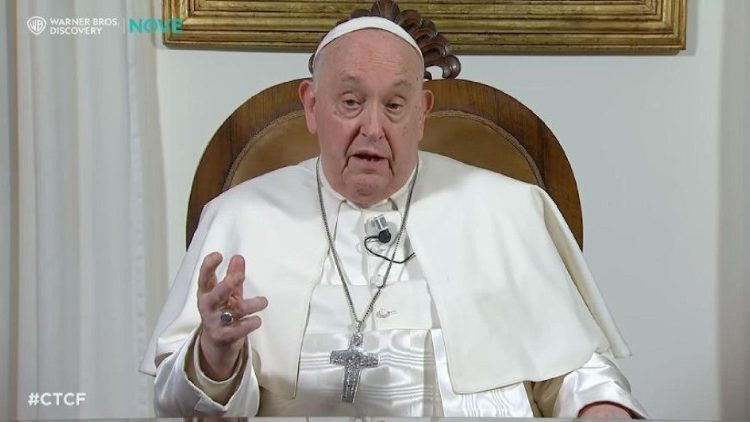Blessings for all, even to “irregular” couples, just as God “blesses everyone, everyone, everyone”; his “fear” of military escalation and the crime of war that has stolen the smile from children; confirmation that he has no intention of resigning, and the announcement of two trips: to Polynesia in August, and to his native Argentina by the end of the year.
These are a few of the topics addressed by Pope Francis in an interview on the Italian TV program “Che tempo che fa”, which aired on Sunday, 14 January.
The Pope responded to a question about the document from the Dicastery for the Doctrine of the Faith, Fiducia supplicans, which opens the possibility of blessing couples in “irregular” situations, including same-sex couples, and which has elicited various reactions.
He reaffirmed that “the Lord blesses everyone, everyone, everyone.”
“We must take these people by the hand,” said the Pope, “not condemn them from the start.”
This is “the pastoral work of the Church,” he noted, calling it an “important” task for confessors, who are called to “forgive everything.”
The Pope revealed that he himself—in 54 years of priesthood—has only once denied forgiveness “due to the person’s hypocrisy.”
The Lord “is not scandalized by our sins, because He is a father, and He accompanies us,” emphasized Pope Francis, expressing his hope that hell might be empty.
As he often has in these months of conflict in the Middle East and these years of war in Ukraine, the Pope repeated his condemnation of the horror of war.
“It’s true that making peace is risky, but war is riskier,” he said.
The Pope also spoke about a meeting he had last Wednesday with a delegation of children from Ukraine. “None of them were smiling,” he said. “Children spontaneously smile; I gave them chocolates, and they did not smile. They had forgotten how to smile, and for a child to forget how to smile is criminal. This is what war does: it prevents dreaming.”
“Behind the wars,” insisted the Bishop of Rome, “there is the arms trade.”
He also shared his fear of the conflict’s expansion: “This military escalation scares me, because this advancing of military steps in the world makes one wonder how we will end up. With atomic weapons now, which destroy everything. How will we end up. Like Noah’s Ark? This frightens me: the capacity for self-destruction that humanity has today.”
In the interview, Pope Francis also addressed the issue of migrants, recalling his embrace with Pato, a young Cameroonian man who lost his wife and daughter in the desert between Tunisia and Libya. The Pope received him in November at his residence in the Casa Santa Marta.
“There is so much cruelty in dealing with these migrants from the time they leave their homes until they arrive here in Europe,” he said. “Everyone has the right to stay in their own home or to migrate.”
The Pope called for a “well-thought-out” migration policy that helps “take the problem of migrants in hand” and “eliminate all these mafias that exploit migrants.”
Pope Francis responded to a question about his possible resignation from the papacy.
“It is neither a thought nor a concern nor even a desire,” he said. “It is a possibility, open to all Popes, but for the moment it is not at the center of my thoughts and concerns, my feelings.”
The Pope then announced two trips that should take place in the course of this year: one in August to an unspecified country or countries in Polynesia, and one to his native Argentina, near the end of the year.
“It is a difficult time for the country,” said Pope Francis. “There is a possibility of making a trip in the second part of the year, because now there is a change of government; there are new things… I want to go there. Ten years is fine; it is okay, I can go.”






